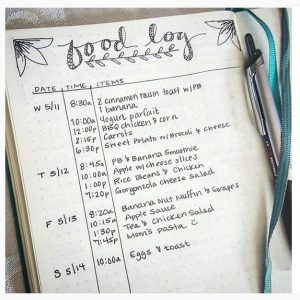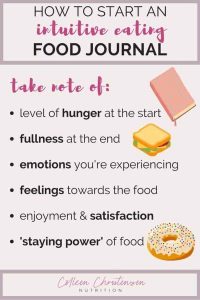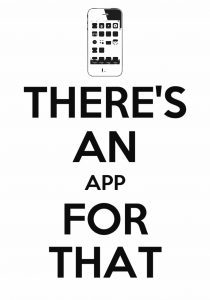We’ve all done it. Something important you need to or want to remember comes to mind. Then you get distracted and forget to
Write It Down!
When you fail to write down appointments, sometimes you miss them. Similarly, a food journal is an appointment with your meals. At first glance, you think “I don’t have time to count calories, let alone write down every…single…bit…of food I eat…daily. What a chore!” However, writing down what you eat can be as simple as using a piece of paper and pencil. Let’s explore the reasons for tracking your daily diet, the pros and cons of noting your food intake, some best practices and even some apps you can try out.
The Importance of Writing It Down!
When you write things down, you become more aware of them. So, whether you are learning a new skill or trying to change an old habit, study after study shows that writing down what you want to do and what you are doing during the process can help you achieve your goal faster and more completely. Mark Murphy, in an April 2018 article in Forbes, writes:
shows that writing down what you want to do and what you are doing during the process can help you achieve your goal faster and more completely. Mark Murphy, in an April 2018 article in Forbes, writes:
- “Study participants were asked to rate the question “My goal is so vividly described in written form (including pictures, photos, drawings, etc.) that I could literally show it to other people and they would know exactly what I’m trying to achieve.” Sadly, fewer than 20% of people said that their goals were ‘Always’ written down this vividly.”
Think about this and apply it to your daily dietary routine. Do you remember breakfast a day ago? If one of your health goals is to lose weight, then knowing what you eat IS an important piece of that goal.
Now, say you want to cut down on sugar. Does it make sense to know what you’re eating on a regular basis? How much sugar you’re consuming? Sure! The best way to learn the amount of sugar you consume in a day or a meal is to take special note of the food you eat.
Pros & Cons
According to Nutrition.org, the pros of keeping track of your diet can include:
- Helping you remember what you have eaten that day.
- Showing you where to improve if you are trying to achieve a goal.
- Let you see what time of day you typically get hungry and help you adjust your eating schedule.
- Help you realize if you are eating out of boredom rather than hunger.
However, research on this topic also indicates that food tracking or journaling can aggravate feelings of shame, guilt and/or an obsession with “getting it right”. According to Nourish With Claire, “Simply writing down what has been consumed may set off “diet” alarm bells that you can’t be trusted with food and food police may convince you to start restricting or avoiding food again.” Obviously, these feelings add unnecessary stress to your life.
Still, Crystal Dicken, writer for the American Society for Nutrition, explains “I did not realize until I started logging my food daily that I was not eating enough calories for my body to function properly. I was suffering from dizziness, fatigue, sleepiness and weakness. As soon as I started eating more throughout the day – all of the symptoms went away.”
How To
Dr. Josh Axe notes that anyone keeping a food journal should “…focus on accuracy and consistency.” In addition, Dr. Axe suggests writing out:
- What exactly you ate. Add details, and be specific, such as by including dressings, toppings, etc. It’s best to write things down as soon as you finish eating them so you don’t forget details.
- How much you ate (your portion size). List the amount of the food and drinks you consumed, even if it’s just an estimate. It can be helpful at first to weigh and measure your food, and then you can try eyeballing portion sizes, such as 1/2 cup of veggies or one cup of pasta. A three-ounce cooked portion of meat is about the size of a deck of cards.
- The time of day & which meal it is (breakfast, snack, lunch, dinner, dessert, etc.).
- Other factors like your mood, energy and location. For example, you might note that you were at a party, a restaurant or eating in a rush while at work.
Megan Ayala, in her article How To Start A Weight Loss Journal, also suggests:
- Tracking water intake
- Making it digital
- Creating graphs from your notes
- Paying attention to when you eat
Some Apps To Try
 It seems there’s ALWAYS “an app for that”. And keeping track of your food intake is no exception. The folks at Healthline, Very Well Fit & Medical News Today did some research and came up with their lists of the top nutrition apps for different goals. Several apps made more than one list, including:
It seems there’s ALWAYS “an app for that”. And keeping track of your food intake is no exception. The folks at Healthline, Very Well Fit & Medical News Today did some research and came up with their lists of the top nutrition apps for different goals. Several apps made more than one list, including:
Always do your research when considering using an app to help you keep track of your food. Some things to think about include:
- Goals
- Fee For Use or “Free” For Use
- Ease of use
Want something on paper? Try these printable designs from The Housewife Modern & Web MD!
Summary
In the end, choose a format that will allow you to be consistent and as accurate as possible when you record journal entries. Don’t worry too much about getting super-specific with entries. Remember: The overall idea is to use journaling to help you see the patterns already established. From there, you can use the information to help you make better choices and decisions about what you eat, when you eat it and, with diligence, reach your weight loss and healthy lifestyle goals.
